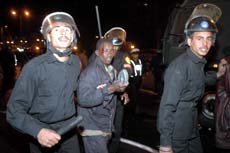|
Egyptian Police Kill 10 Sudanese Refugees
 |
|
Unconscious Sudanese woman is lifted up by Egyptian riot police. (Reuters)
|
CAIRO,
December 30, 2005 (IslamOnline.net & News Agencies) - Ten Sudanese
refugees were killed Friday, December 30, when thousands of Egyptian
riot police forcefully broke up a three-month protest they had been
staging outside UN offices in Cairo.
Egyptian
police armed with sticks and shields broke up the small square where the
Sudanese refugees had been camping at around 5:00 am (0300 GMT), Agence
France-Presse (AFP) said.
"There
was a stampede that left 30 of the protesters injured, most of them the
elderly and young and they were immediately taken to the hospital where
10 of them died," said a statement by the Egyptian interior
ministry.
The
ministry added that twenty-three police officers were wounded, accusing
migrant leaders of inciting attacks against the police.
The
statement said that attempts had been made to convince the refugees to
disperse but to no avail.
The
police forces -- who numbered close to 5,000 in the neighborhood for the
operation -- initially used water cannon in a bid to disperse the
refugees.
Several
people were seen being dragged away from the mayhem, as the refugees --
including dozens of women and small children -- tried to resist their
evacuation.
The
refugees were forced into dozens of buses lined up on one of the main
thoroughfares in Cairo's neighborhood of Mohandessin, ending a standoff
that had lasted most of the night.
"They
want to kill us," shouted one Sudanese protester as he was
frog-walked towards a bus.
"Our
demands are legitimate, it is our right to protest here, the only right
we have."
UN
"Deeply Shocked"
Meanwhile,
the head of the UN refugee agency said he was "deeply shocked"
at the killings.
"I
am deeply shocked and saddened by the tragic events early today in
Cairo," High Commissioner for Refugees Antonio Guterres said in
Geneva, according to AFP.
"Although
we still do not have all of the details or a clear picture of what
transpired, violence left several people dead and injured.
"There
is no justification for such violence and loss of life. This is a
terrible tragedy and our condolences go to all the families of those who
died and to the injured," he said.
"Police
Crime"
 |
|
Egyptian riot police arrest injured Sudanese man after storming their makeshift camp. (Reuters)
|
The
violent intervention of Egyptian police to disperse the protests has
drawn rebukes from a human rights group.
"The
Egyptian police handling of the protests of the Sudanese refugees is by
all means a crime," Nijad Al-Boraei of the Egyptian Organization
for Human Rights told Al-Jazeera Friday.
He
said that the Egyptian police are used to resorting to excessive force
in dealing with protests.
"Friday's
police handling of the protests brings to mind police practices during
the Egyptian parliamentary elections, which left 11 people killed."
Up
to 3,000 protesters had been living at the camp since it was set up on
September 29.
The
long-running demonstration began after the United Nations Higher
Commissioner for Refugees (UNHCR) stopped aid to those who had applied
and failed to get refugee status.
The
UNHCR says it has to prioritize help for people genuinely at risk of
persecution and cannot solve issues of discrimination and deprivation in
Egypt, where unemployment is high.
It
says that most of the Sudanese demonstrators are economic migrants
rather than those fleeing persecution, and so do not qualify as
refugees.
But
many of the protesters argue it is not yet safe to return to Sudan,
despite the signing of a peace accord nearly a year ago which ended the
21-year north-south civil war.
"The
trust is gone. We will be happy if we end up in any other country, but
look how this Arab country is treating us, just because we are black.
It's a disgrace," Paul, a young refugee from the southern Sudanese
city of Juba, told AFP just before being evacuated.
"They
are telling us to go back because the war is over, but it's not so
simple," said George Oliver, a 20-year-old from the same region.
"There
are people here from all parts of the country who have had problems with
the army. I seized from the street in Khartoum and drafted by force in
the military. Now I am here, if I go back to Sudan, they will find
me," he said.
|